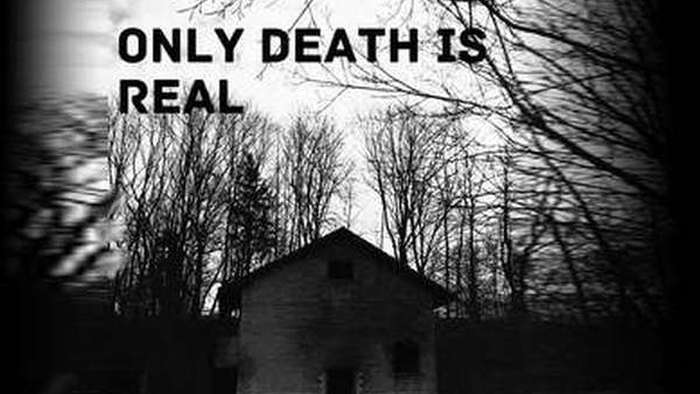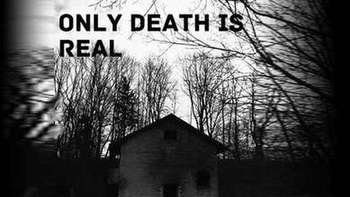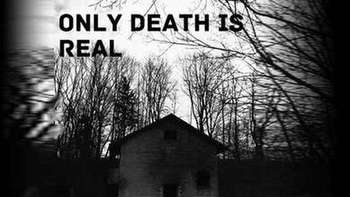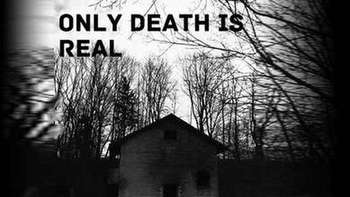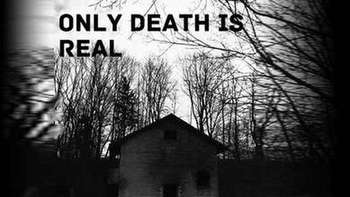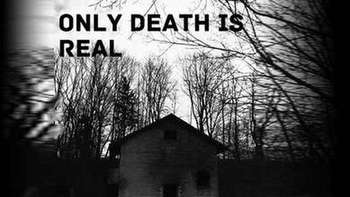The collection of artists that make up this edition of Only Death Is Real have something that connects them. Despite the surface appearances being markedly different across the board, the five bands/musicians gathered here have been wildly prolific in their careers -- whether that’s for a long or a short time, or for concentrated bursts, they all create staggering amounts of music as well as making sure that each release is packed with quality. And here I am, struggling to manage to knock out a column once every two months. Still, quality over quantity…..right?
Esoctrilihum – Luadimmerantia (Self-Released)
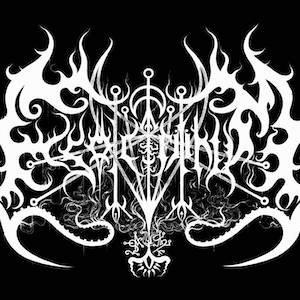 Not content with releasing only a full-length in 2022, French one-man black metal project Esoctrilihum has deemed it necessary to go ahead and release an EP, too. A short and spritely three track offering, Luadimmerantia, fills the gothic gaps of their longform work with a doomier feeling and a heavier hand. Asthâghul, never one to shy away from deviant themes, fills this EP with chants of death and blood (at least, you have to assume, considering lyrics are not available) and a unique guitar tone that can be found on other Esoctrilihum releases.
Not content with releasing only a full-length in 2022, French one-man black metal project Esoctrilihum has deemed it necessary to go ahead and release an EP, too. A short and spritely three track offering, Luadimmerantia, fills the gothic gaps of their longform work with a doomier feeling and a heavier hand. Asthâghul, never one to shy away from deviant themes, fills this EP with chants of death and blood (at least, you have to assume, considering lyrics are not available) and a unique guitar tone that can be found on other Esoctrilihum releases.
“Torture” begins with an immediate infernal energy as the music starts at full speed and Asthâghul’s voice reigns supreme. It is terrifying, as though it has erupted from the deep core of the earth and burst through the veil that holds the underworld in its own domain. Esoctrilihum aims to break the threads that tie us to reality and with Luadimmerantia those threads become weaker as the EP progresses. The title track starts similarly with almost no pause before the song is thrown full pelt into the darkness as Asthâghul’s demonic presence becomes the focus. Esoctrilihum’s horror-esque black metal is an entity of its own and it is hard to think of a band who matches the kind of lore and off-kilter energy of the project.
Gudsforladt – Friendship Love and War (Night of the Palemoon)
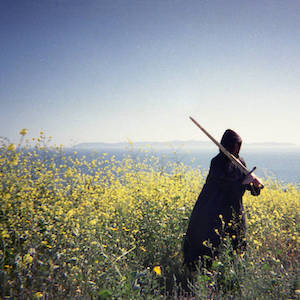 Gudsforladt may only be on their second full-length since the band’s inception in 2016, but the solo project of one known as DM has not been taking it easy, at least in the early years of the band. Having taken somewhat of a break after a run of EPs and splits between the start of the project and 2020, Gudsforladt is back with Friendship, Love and War, a record whose narrative threads are a tale old as time -- a quest that is deemed impossible must be undertaken in order to fend off impending death. Easy, right?
Gudsforladt may only be on their second full-length since the band’s inception in 2016, but the solo project of one known as DM has not been taking it easy, at least in the early years of the band. Having taken somewhat of a break after a run of EPs and splits between the start of the project and 2020, Gudsforladt is back with Friendship, Love and War, a record whose narrative threads are a tale old as time -- a quest that is deemed impossible must be undertaken in order to fend off impending death. Easy, right?
Friendship, Love and War takes a simpler approach to black metal than most on this list as Gudsforladt utilises medieval tones to create a more “traditional” sounding style that allows for breathing space between notes and screams. It is often reminiscent of Bathory or Thin Lizzy in the Celtic rhythms of “Beyond Where They May Follow” and the instrumental interludes that pepper the album take those influences to their core. “The Criminal and His Willing Sacrifice In Repentance” begins on a beautiful acoustic section that sets the stage for a cinematic track that takes in several differing sounds to create the unique Gudsforladt tone. The traditional sound of heavy metal lies beneath tight screams while folky sections push the song into the realm of something completely other to the base genre the band is tied to. Layered clean vocals add depth to the song and spins it into something that could be sang around the campfire with comrades after a glorious win on the battlefield. It is a majestic album and one that does not tire with repeated listens.
Nadja – Labyrinthe (Broken Spine Productions)
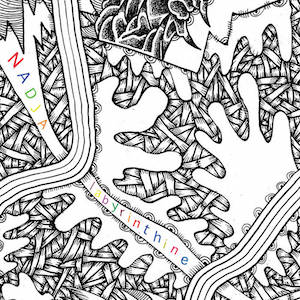 Berlin-based Nadja apparently never sleep because Labyrinthe is their third full-length in 18 months. Categorising the duo of Aidan Baker and Leah Buckareff is an essay unto itself and so let’s just say that Labyrinthe is likely the doomiest thing the two have created in a while and much of that is due to the inclusion of a range of different vocalists. First track “Labyrinthe” features the horrifically affected voice of Alan Dubin of Khanate, a voice that conjures nightmares with naught but a pause before launching into tense screams that follow the instrumentation patterns with a preternatural ease.
Berlin-based Nadja apparently never sleep because Labyrinthe is their third full-length in 18 months. Categorising the duo of Aidan Baker and Leah Buckareff is an essay unto itself and so let’s just say that Labyrinthe is likely the doomiest thing the two have created in a while and much of that is due to the inclusion of a range of different vocalists. First track “Labyrinthe” features the horrifically affected voice of Alan Dubin of Khanate, a voice that conjures nightmares with naught but a pause before launching into tense screams that follow the instrumentation patterns with a preternatural ease.
Esben & The Witch’s Rachel Davies lends her voice to second track, “Rue,” which passes by with a haunting presence as her voice curls around deep bass riffs and overdriven guitars. The effect is one of overwhelming dread as the beauty of Davies’ voice plays against the weight of Baker’s and Buckareff’s instruments, fighting for dominance as neither moves to give in. This push and pull echoes through into “Blurred,” this time with Elizabeth Colour Wheel’s Lane Shi Otayonii on vocals.
Each track on Labyrinthe pushes way past the ten minute mark but they are interesting and hold your attention throughout. Nothing is used “just because,” rather it is a deliberate and methodical way of working as Nadja use overdriven guitars and deep bassy rumbles to create textured walls of sound, each more monumental than the last. By the time the final track is reached, which features Dylan Walker of Full Of Hell, you are lost in the maze Nadja have built with their music. “Necroausterity” is a sludgy, filthy grind that uses fuzzed-out effects and horrifying vocal lines to flesh out the horror within. It is a fascinating and terrifying piece that will stay with you long after the final notes have subsided.
Trhä - vat gëlénva!!! (Self-Released)
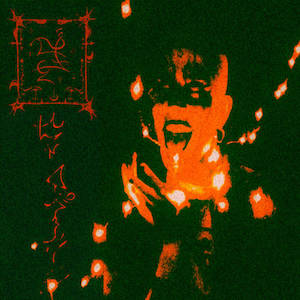 Recently revealed as being another project from Sadness’ Damián Antón Ojeda, Trhä is the sound of magic working its way through an earthly vessel. Ojeda has spoken about the band name being a kind of key to opening and moving through another world and the music certainly speaks to that idea in that it often feels as though it is echoing from another time and place. Trhä either pulls from serenity or from anger and on vat gëlénva we are privy to the rage that Thét Älëf (Ojeda’s pseudonym for the project) channels through bizarre switches of time signature, curious drum patterns and vocals that are heightened with shrieks and screams.
Recently revealed as being another project from Sadness’ Damián Antón Ojeda, Trhä is the sound of magic working its way through an earthly vessel. Ojeda has spoken about the band name being a kind of key to opening and moving through another world and the music certainly speaks to that idea in that it often feels as though it is echoing from another time and place. Trhä either pulls from serenity or from anger and on vat gëlénva we are privy to the rage that Thét Älëf (Ojeda’s pseudonym for the project) channels through bizarre switches of time signature, curious drum patterns and vocals that are heightened with shrieks and screams.
Written and presented in a language created by Thét Älëf, Trhä’s music acts as a gateway, or passage, to a world in which magic and desire go hand in hand and in vat gëlénva that world is rendered in fiery tones and pulsing malignance. “ljúshtaeshrhendlhë jecan glézma” is the first track on the album and it processes through several emotions before reaching the zenith of Thét Älëf’s wrath in its closing minutes. We hear the unparalleled scorn of the artist spilling through the ether as the voice becomes inhuman and takes on an ever more alien feel. Further on, “grã sôhhlen bem rhôn trhãthàs” seethes with spite yet looking closer reveals small motifs and riffs that are familiar as almost a trademark of Trhä’s sound. There’s a sly melancholy curled around the edges of the song as it picks up on past works while pushing the band into a territory that one would not expect. vat gëlénva certainly feels different compared to the harsher sounds we heard on the split with Celestial Sword, for example, as the ethereal make way for the infernal.
There is a clearer use of groove on the aforementioned track which later bursts with radiant light as synths explode and the song ramps up its pace once again. The nightmare continues as “ödënthändelä vòn la gönmëtwa” opens with eerie keys that are reminiscent of a circus song, albeit one that is laced with venom, and when the song occasionally switches back to this sinister melody there is a tangible sense of unease that accompanies it. For being the band’s third album of 2022, there is no lack of creativity or spark to be heard as Thét Älëf allows themself to be a mystical conduit for an other world to be seen. It is as glorious as ever and some of the best raw black metal to be heard in recent years.
